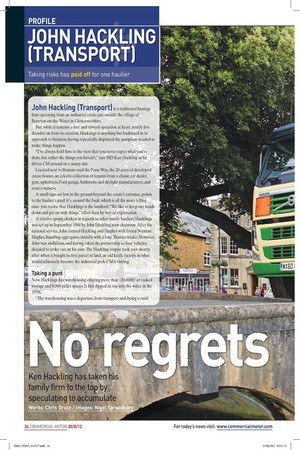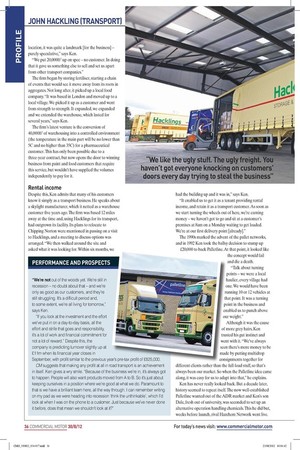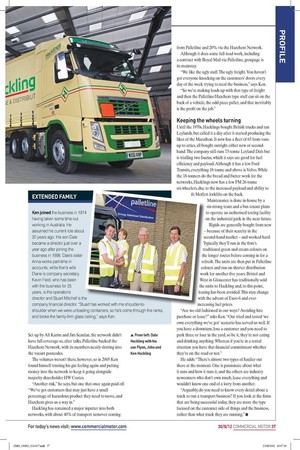No regrets
Page 23

Page 25

Page 26

If you've noticed an error in this article please click here to report it so we can fix it.
Ken Hackling has taken his family firm to the top by speculating to accumulate
Words: Chris Druce / Images: Nigel Spreadbury John Hackling (Transport) is a traditional haulage firm operating from an industrial estate just outside the village of Bourton-on-the-Water in Gloucestershire.
But, while it remains a hire and reward operation at heart, nearly five decades on from its creation, Hacklings is anything but backward in its approach to business, having repeatedly displayed the gumption needed to make things happen.
“I’ve always held firm to the view that you never regret what you’ve done, but rather the things you haven’t,” says MD Ken Hackling as he drives CM around on a sunny day.
Located next to Roman road the Fosse Way, the 20 acres of developed estate houses an eclectic collection of tenants from a classic car dealer, gym, upholsters, Ford garage, bathroom and skylight manufacturers, and even a nursery.
A small sign, set low in the ground beyond the estate’s entrance, points to the haulier’s yard. It’s around the back, which is all the more telling once you realise that Hacklings is the landlord. “We like to keep our heads down and get on with things,” offers Ken by way of explanation.
A relative spring chicken in regards to other family hauliers, Hacklings was set up in September 1964 by John Hackling, now chairman. After his national service, John formed Hackling and Hughes with friend Norman Hughes, handling aggregates, initially with a lone Thames trader. However, John was ambitious, and having taken the partnership to four vehicles, decided to strike out on his own. The Hackling empire took root shortly after when it bought its first parcel of land, an old kettle factory, in what would ultimately become the industrial park CM is visiting.
Taking a punt
Now, Hacklings has warehousing offering more than 120,000ft2 of racked storage and 8,000 pallet spaces. It first dipped its toe into the water in the 1970s.
“The warehousing was a departure from transport and, being a rural location, it was quite a landmark [for the business] – purely speculative,” says Ken.
“We put 20,000ft2 up on spec – no customer. In doing that it gave us something else to sell and set us apart from other transport companies.” The firm began by storing fertiliser, starting a chain of events that would see it move away from its roots in aggregates. Not long after, it picked up a local food company. “It was based in London and moved up to a local village. We picked it up as a customer and went from strength to strength. It expanded, we expanded and we extended the warehouse, which lasted for several years,” says Ken.
The firm’s latest venture is the conversion of 40,000ft2 of warehousing into a controlled environment (the temperature in the main part will be no lower than 5C and no higher than 35C) for a pharmaceutical customer. This has only been possible due to a three-year contract, but now opens the door to winning business from paint and food customers that require this service, but wouldn’t have supplied the volumes independently to pay for it.
Rental income
Despite this, Ken admits that many of his customers know it simply as a transport business. He speaks about a skylight manufacturer, which it netted as a warehouse customer five years ago. The firm was based 12 miles away at the time and, using Hacklings for its transport, had outgrown its facility. Its plans to relocate to Chipping Norton were mentioned in passing on a visit to Hacklings, and a meeting to discuss options was arranged. “We then walked around the site and asked what it was looking for. Within six months, we had the building up and it was in,” says Ken.
“It enabled us to get it as a tenant providing rental income, and retain it as a transport customer. As soon as we start turning the wheels out of here, we’re earning money – we haven’t got to go and sit at a customer’s premises at 8am on a Monday waiting to get loaded. We’re at our first delivery point [already].” The 1990s marked the advent of the pallet networks, and in 1992 Ken took the ballsy decision to stump up £20,000 to back Palletline. At that point, it looked like the concept would fail and die a death.
“Talk about turning points – we were a local haulier, every village had one. We would have been running 10 or 12 vehicles at that point. It was a turning point in the business and enabled us to punch above our weight.” Although it was the cause of more grey hairs, Ken trusted his gut instinct and went with it. “We’ve always seen there’s more money to be made by putting multidrop consignments together for different clients rather than the full-load stuff, so that’s always been our market. So when the Palletline idea came along, it was easy for us to adapt into that,” he explains.
Ken has never really looked back. But a decade later, history seemed to repeat itself. The now well-established Palletline wanted out of the ADR market and Ken’s son Dale, fresh out of university, was seconded to set up an alternative operation handling chemicals. This he did but, weeks before launch, rival Hazchem Network went live. Set up by Ali Karim and Jim Scanlan, the network didn’t have full coverage so, after talks, Palletline backed the Hazchem Network, with its members neatly slotting into the vacant postcodes.
The volumes weren’t there, however, so in 2005 Ken found himself trusting his gut feeling again and putting money into the network to keep it going alongside majority shareholder HW Coates.
“Another risk,” he says, but one that once again paid off. “We’ve got customers that may just have a small percentage of hazardous product they need to move, and Hazchem gives us a way in.” Hackling has remained a major inputter into both networks, with about 40% of transport turnover coming from Palletline and 20% via the Hazchem Network.
Although it does some full-load work, including a contract with Royal Mail via Palletline, groupage is its mainstay.
“We like the ugly stuff. The ugly freight. You haven’t got everyone knocking on the customers’ doors every day of the week trying to steal the business,” says Ken.
“So we’re making loads up with that type of freight and then the Palletline/Hazchem type stuff can sit on the back of a vehicle, the odd piece pallet, and that inevitably is the profit on the job.”
Keeping the wheels turning
Until the 1970s, Hacklings bought British trucks and ran Leylands, but called it a day after it started producing the likes of the Marathon. It now has a fleet of 65 from vans up to artics, all bought outright either new or secondhand. The company still runs 7.5-tonne Leyland Dafs but is trialling two Isuzus, which it says are good for fuel efficiency and payload. Although it has a few Ford Transits, everything 18-tonne and above is Volvo. While the 18-tonners do the bread and butter work for the networks, Hacklings now has a few FM 26-tonne six-wheelers, due to the increased payload and ability to fit Moffett forklifts on the back.
Maintenance is done in-house by a six-strong team and a bus tenant plans to operate an authorised testing facility on the industrial park in the near future.
Rigids are generally bought from new – because of their scarcity in the second-hand market – and worked hard. Typically they’ll run in the firm’s traditional green and cream colours on the longer routes before coming in for a refresh. The units are then put in Palletline colours and run on shorter distribution work for another five years. Bristol and West in Gloucester has traditionally sold the units to Hackling and, to this point, leasing has been avoided. This may change with the advent of Euro-6 and everincreasing fuel prices.
“Are we old fashioned in our ways? Avoiding hire purchase or lease?” asks Ken. “Our tried and tested ‘we own everything we’ve got’ scenario has served us well. If you have a downturn, lose a customer and you need to park three or four in the yard, so be it, they’re not eating and drinking anything. Whereas if you’re in a rental situation you have that financial commitment whether they’re on the road or not.” He adds: “There’s almost two types of haulier out there at the moment. One is passionate about what it runs and how it runs it, and the others are industry newcomers who don’t own much, lease everything and wouldn’t know one end of a lorry from another.
“Arguably, do you need to know every detail about a truck to run a transport business? If you look at the firms that are being successful today, they are more the type focused on the customer side of things and the business, rather than what truck they are running.” n
PERFORMANCE AND PROSPECTS
“We’re not out of the woods yet. We’re still in recession – no doubt about that – and we’re only as good as our customers, and they’re still struggling. It’s a difficult period and, to some extent, we’re all living for tomorrow,” says Ken.
“If you look at the investment and the effort we’ve put in on a day-to-day basis, all the effort and strife that goes and responsibility, it’s a lot of work and financial commitment for not a lot of reward.” Despite this, the company is predicting turnover slightly up at £11m when its financial year closes in September, with profit similar to the previous year’s pre-tax profit of £825,000.
CM suggests that making any profit at all in road transport is an achievement in itself. Ken gives a wry smile. “Because of the business we’re in, it’s always got to happen. People will also want products moved from A to B. So it’s just about keeping ourselves in a position where we’re good at what we do. Paramount to that is we have a brilliant team here, all the way through. I can remember writing on my pad as we were heading into recession ‘think the unthinkable’, which I’d look at when I was on the phone to a customer. Just because we’ve never done it before, does that mean we shouldn’t look at it?”
EXTENDED FAMILY
Ken joined the business in 1974 having taken some time out working in Australia. He assumed his current role about 20 years ago. His son Dale became a director just over a year ago after joining the business in 1998. Dale’s sister Anna works part-time in accounts, while Ken’s wife Diane is company secretary.
Kevin Field, who has been with the business for 25 years, is the operations director and Stuart Mitchell is the company financial director. “Stuart has worked with me shoulder-to shoulder when we were unloading containers, so he’s come through the ranks, and broke the family-firm glass ceiling,” says Ken.








































